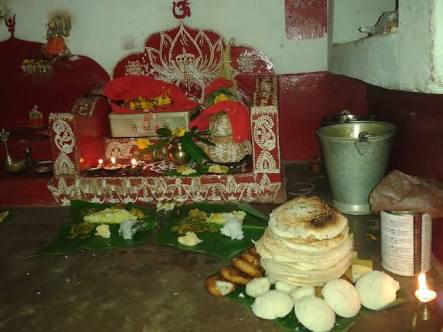Bhubaneswar: Odisha worships Goddess Lakshmi on Gurubar (Thursday) during the lunar month of Margasira.
This occasion is correlated with cultivation and harvesting, which are the main profession of the people of the countryside. By this month, farmers, who had toiled hard in the fields for the past few months, fill their reeks and barns with freshly harvested paddy. They consider it as the grace and blessing of Goddess Lakshmi and worship Mana filled with freshly harvested paddy as her icon. Mana is a pot made of bamboo canes used in the olden days for measuring paddy.
It is believed that the Goddess visits every house during Manabasa Gurubar and therefore, the female members perform this puja with devotion.
THE LEGEND
The Legend of Manabasa Gurubar is based on the ancient scripture “Laxmi Puran”. In ancient times, the untouchables were not allowed to pray, worship and conduct rituals. Pleased with the devotion of a scavenger woman named Sriya Chandaluni, Goddess Lakhmi, however, visited her home.
This act, however, angered Balaram, the elder brother of Jagannath, and she was turned out of Jagannath Temple, Puri, at his behest.
The Goddess was shown the door for ending discrimination on earth by encouraging even untouchables to conduct rituals and worship. While leaving the temple, she cursed her husband and elder brother-in-law saying that they would have to go through a prolonged ordeal without food, water or shelter. The curse of Laxmi has had a severe impact on both brothers for 12 years. Soon they realise her importance and Laxmi too agreed to return but on one condition, there will be no discrimination of caste and creed on earth.
The 15th-century text Lakhmi Purana written by Balaram Das is the first text against the practice of untouchability and caste discrimination. It also stresses the importance of feminism and empowers the female to resist male hegemony.
MAIN FEATURES
Clean House
It is believed that Goddess Lakshmi loves a spic-and-span house, so women wake up early and clean up their houses before performing puja.
Jhoti Chita
After cleaning the house, the women make a beautiful Jhoti Chita. It is made from rice paste. A piece of cloth tied to a stick is used to create beautiful Jhotis. The women draw Jhotis in different shapes like flowers, mostly lotus and the feet of Goddess Lakshmi.
Manda Pitha (Rice Dumpling)

Manda pitha, a steamed pancake, is prepared during some of the festivals in Odisha, including Manabasa Gurubar.
Khatuli, Mana
Khatuli is a low table, on which women spread newly harvested paddy grains for the puja. Then they fill the Mana with the grains and place it on the low table.
Maha Laxmi Purana

Women read the Maha Laxmi Purana written by ancient poet Balaram Das while performing the puja. Without it, the puja is considered incomplete.
Red and White combination saree
Women wear new sarees in a combination of white and red for the puja. Hindu Odia married women usually perform this puja. It continues for four Thursdays in the month of Margasira.


